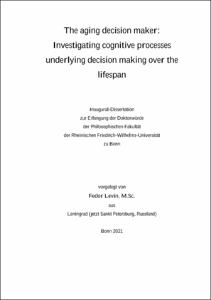Levin, Fedor: The aging decision maker: Investigating cognitive processes underlying decision making over the lifespan. - Bonn, 2021. - Dissertation, Rheinische Friedrich-Wilhelms-Universität Bonn.
Online-Ausgabe in bonndoc: https://nbn-resolving.org/urn:nbn:de:hbz:5-64394
Online-Ausgabe in bonndoc: https://nbn-resolving.org/urn:nbn:de:hbz:5-64394
@phdthesis{handle:20.500.11811/9391,
urn: https://nbn-resolving.org/urn:nbn:de:hbz:5-64394,
author = {{Fedor Levin}},
title = {The aging decision maker: Investigating cognitive processes underlying decision making over the lifespan},
school = {Rheinische Friedrich-Wilhelms-Universität Bonn},
year = 2021,
month = nov,
note = {Aging is a complex process that can lead to numerous changes in a person’s life. Previous research has described age-related changes in cognitive abilities that may adversely affect decision making processes. This dissertation addressed such effects that have a potential to influence the value-based decision making of older adults.
Three studies were conducted to investigate the contributions of episodic memory, positivity effect and episodic future thinking to decision making of older adults. The first study addressed the contribution of episodic memory to the process of construction of subjective values of alternatives during value-based decisions. The findings demonstrated the involvement of episodic memory in value-based decision making of older adults.
The second study investigated an age-related positivity effect that manifests as an increased bias towards positive stimuli by older adults. Altogether, the results suggested similarities in positivity in information search of older and younger adults, as well as similarities in resulting decision quality.
The third study in this dissertation examined episodic future thinking of older adults and its contribution to decision making. The findings showed that episodic future thinking promoted future-oriented choices in older as well as in younger adults.
Overall, the results from the studies in this dissertation suggest a complex picture of investigated age-related changes in cognitive abilities and corresponding decision processes. Decision making in older adults may be adversely affected by a decline in episodic memory performance, as shown in the first study. However, the second and the third studies did not provide evidence for the lower decision quality due to the positivity effect and for the decline in episodic future thinking. The findings presented in this dissertation provide several directions for future research on value-based decision making in aging as well as for practical applications.},
url = {https://hdl.handle.net/20.500.11811/9391}
}
urn: https://nbn-resolving.org/urn:nbn:de:hbz:5-64394,
author = {{Fedor Levin}},
title = {The aging decision maker: Investigating cognitive processes underlying decision making over the lifespan},
school = {Rheinische Friedrich-Wilhelms-Universität Bonn},
year = 2021,
month = nov,
note = {Aging is a complex process that can lead to numerous changes in a person’s life. Previous research has described age-related changes in cognitive abilities that may adversely affect decision making processes. This dissertation addressed such effects that have a potential to influence the value-based decision making of older adults.
Three studies were conducted to investigate the contributions of episodic memory, positivity effect and episodic future thinking to decision making of older adults. The first study addressed the contribution of episodic memory to the process of construction of subjective values of alternatives during value-based decisions. The findings demonstrated the involvement of episodic memory in value-based decision making of older adults.
The second study investigated an age-related positivity effect that manifests as an increased bias towards positive stimuli by older adults. Altogether, the results suggested similarities in positivity in information search of older and younger adults, as well as similarities in resulting decision quality.
The third study in this dissertation examined episodic future thinking of older adults and its contribution to decision making. The findings showed that episodic future thinking promoted future-oriented choices in older as well as in younger adults.
Overall, the results from the studies in this dissertation suggest a complex picture of investigated age-related changes in cognitive abilities and corresponding decision processes. Decision making in older adults may be adversely affected by a decline in episodic memory performance, as shown in the first study. However, the second and the third studies did not provide evidence for the lower decision quality due to the positivity effect and for the decline in episodic future thinking. The findings presented in this dissertation provide several directions for future research on value-based decision making in aging as well as for practical applications.},
url = {https://hdl.handle.net/20.500.11811/9391}
}






